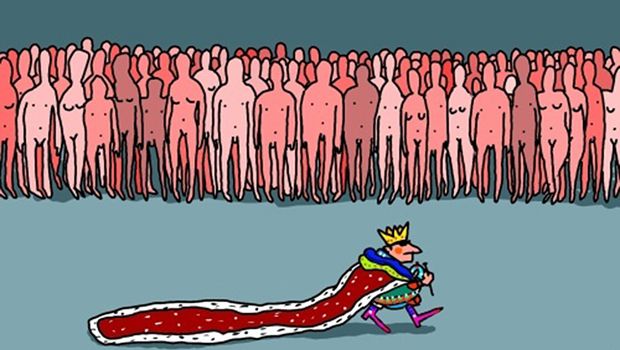The serf syndrome
Attitude to serfdom as a watershed between Ukraine and Russia
We are experiencing stark aggression on the part of our northern neighbor. But even in these cruel times, our public (particularly intellectuals) is displaying keen eyesight and sober judgment and has a nice opportunity to analyze, “excise,” as if with a scalpel, and closely watch serious ulcers in the societal awareness of Putin’s Russia. In fact, these very ulcers (sometimes they assume a more “decent” shape of self-deception) have prompted the truly educated, at first glance, citizens of that country – lawyers, historians, economists, sociologists, and diplomats – to “break the bones of the truth” in order to obligingly execute the imperial order. For what is science in comparison with the relentless interests of the state!
Take, for example, Professor Valery Zorkin, Doctor of Law, chairman of the Constitutional Court of Russia (he also held this office in the fall of 1993 during a bitter face-off between the then Russian President Boris Yeltsin and the Supreme Council of Russia, in fact siding with the latter). This jurist and, at the same time, one of Russia’s best practical lawyers, has come up with the article “A Fast, Fair, and Equitable Trial for All. The Judicial Reform of Alexander II: Lessons for Russia’s Legal Development.” Mr. Zorkin’s material is timed with the 150th anniversary of judicial reform carried out by the “liberator tsar, a reformer and modernizer of the empire” (it will be recalled that Ukrainians, too, have more than ample grounds to say a “good word” to his initiatives, especially the brutal bans on the Ukrainian language and culture in 1863 and 1876. Yet Zorkin’s article, naturally, does not deal with this).
The head of the Russian Constitutional Court strives to put across “the necessity of a drastic modernization in very many spheres of our life” to the readers, his compatriots. “I would not like to dramatize things, but I am afraid that a drastic modernization will soon need an active – and collective – mobilization of the strength and spirit of the broadest Russian masses.” This statement is as bombastic as it is false, for a despotic regime, which has only strengthened in Russia of late, is not capable of being “modernized” and “reformed” by definition, and Mr. Zorkin knows this.
But this is not the point. What drew my attention is the following passage of the author (he carefully analyzes the history of reforms and reformers in the 19th-century Russian empire from Speransky to Alexander II, to whose transformations, above all, in the judicial sphere, he devotes the greater part of his article): “This reform [he means the abolition of serfdom, not changes in the legal procedure. – Author] ruined something very painfully in Russian society… For all its defects, serfdom was the main ‘clamp’ that maintained the nation’s internal unity. It is no mere chance that, according to historians, peasants used to say to their former masters after the reform: ‘We were yours, and you were ours.’”
A very interesting idea. At least a few consequences can be drawn from it:
a) Well before the abolition of serfdom in 1861, there was an “internal unity” of a “nation” (which one, I wonder? Russian? Down with all the other nations?). This needs to be clarified, for the Romanovs’ imperial machine was a multiethnic state. In essence, it is about the views of such as Zorkin that Taras Shevchenko wrote with biting and bitter sarcasm in the poem Caucasus 16 years before the abolition of serfdom:
“All silent are in all their tongues
Because such great contentment reigns!”
b) The abolition of serfdom broke this “internal unity” and destroyed this “main clamp.” Let us thank Mr. Zorkin for not writing at all that this abolition was evil, to say the truth…
c) The “defects” of serfdom seem to be admitted, albeit reluctantly, willy-nilly, through clenched teeth…
We, Ukrainians, have a full historical and moral right to interpret this statement of Russia’s chief constitutionalist (and, of course, “modernizer”) as a “detonating mixture” of hypocrisy, “sons of the soil” myths, and outright cynicism. Before our land was enslaved by Peter I and Catherine II (especially by the latter, for the “mother tsarina” applied the norms of serfdom to Ukraine in 1783, turning a million peasants into slaves), we were not powerless slaves, but we were free (since the times of Bohdan Khmelnytsky) Cossacks, peasants, and burghers. And we were free of those “unity clamps” (in reality, shackles) about which Zorkin writes. Honoring the genius of Shevchenko, we remember the reminiscences of his friends: knowing that serfdom was soon to be abolished, the exhausted and dying poet asked his guests: “Is there freedom?!” And, hearing “Not yet,” he began to weep bitterly.
Nevertheless, Mr. Zorkin’s reflections still contain the terrible truth that deserves to be pondered on seriously. It is quite probable that slavish dependence on the state (not on the landlord as an individual) is an unshakeable centuries-old foundation on which the mighty Russian despotic imperial power was, is, and will be standing. Moreover, it is a proven fact. But what does this have to do with “modernization”? And one more thing. For some reason, the impression is that the Moscow jurist extols serfdom not so much retrospectively, as a researcher of the past, as in an attempt to foresee the future. If this is the case, his lines assume a truly sinister coloring, for this was written by a person who is one of Russia’s top 10 officials.”






